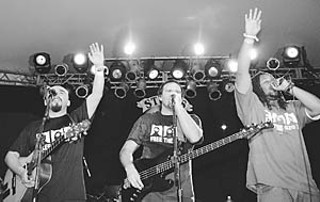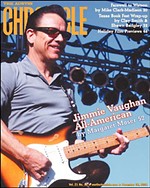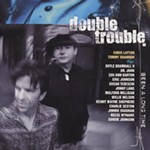The Return of 'The Ozo 3'
Ozomatli bassist Willy Abers on conga lines, crowds, APD, and Austin
By Andy Langer, Fri., April 16, 2004

When the band Ozomatli hit town for last month's South by Southwest Music Festival, they came to showcase as one of nearly 1,200 acts. A day later, two of the band's members and their manager were rebranded "The Ozo 3" – front-page fodder and living proof that a conga line could have criminal and political repercussions.
As recounted by the Chronicle's Jordan Smith ("Not Quite 'Ya Se Fue!,'" News, March 26), the band's Exodus show on SXSW's opening night ended with a conga line and three arrests. Bassist Willy Abers was charged with failure to obey a lawful order (a class C misdemeanor, punishable by up to a $500 fine); band manager Amy Blackman-Romero was charged with interfering with police duties (a class B misdemeanor, punishable by up to 180 days in jail); and drummer Jiro Yamaguchi was charged with assault on a police officer (a third-degree felony, punishable by up to 10 years in jail).
The band disputes the official police account of the arrests, but a little more than a month later, the charges stand. All three were released in time for the band to play a second SXSW appearance that Saturday evening at Stubb's. (Full disclosure: I am a contributing editor for the showcase's title sponsor, Esquire magazine.)
Next Thursday, honoring a booking confirmed well before SXSW, Ozomatli appears at La Zona Rosa. Because police initially confronted Ozomatli for violating the sound ordinance by playing in the street at 2:30am, city council members Brewster McCracken and Betty Dunkerley have proposed re-examining the ordinance and perhaps granting suspensions during SXSW. They also invited the band to play Thursday's council meeting, promising an official "Ozomatli Day" proclamation for their troubles. The band initially accepted, but cancelled this week, citing the unresolved charges.
In advance of the show, we asked one of the Ozo 3 – bassist Willy "Wil-Dog" Abers – for his impressions of the night in question and its aftermath.
Austin Chronicle: Last month, the idea must have been to play two shows and leave town. Didn't quite happen that way, did it?
Willy Abers: Yeah. We came just to do our thing. And that's what's kind of bizarre. With us, we just kind of live in the moment. So it kind of just happened – we didn't have any say in the matter. There was nothing we could do about it. And I think that's the hardest part. We're a band – we're accustomed to controlling music and an atmosphere. And we weren't allowed to do that. That's the trippy part.
AC: Take me through Ozomatli's conga line tradition.
WA: Normally we start and finish in the audience. We'll start at the back of the club or arena, walk in through the crowd, and get onstage. After our full set, we take our drums and horns and head into the audience for what's really a continuation of the show. ... There are even people that come with instruments – shakers, bells, whatever – and connect on that level. When we first did it, we just thought it would be cool. ... But what we learned is the value of actually seeing the faces of our fans and connecting with them. Since we end in the crowd, everyone that wants to gets the chance to talk to us and ask us questions. It's become part of the whole experience. We love doing it. And people love seeing it and being a part of it. It's worked out well.
AC: Until the Wednesday of SXSW. Apparently the Austin Fire Department found an extra 200 people in the club you were playing. Were you literally deputized by the fire marshals to help get people out of the club?
WA: Were we told by law enforcement? No. We were told by our manager, who was told by the club, who was told by the fire department. By the time it got to us, who knows what was actually said. It's like the telephone game at a junior high party. We were assuming that's what they wanted us to do.
AC: Which meant getting people out of the room by having them follow the conga line out?
WA: That's what it meant to us – that we needed to clear the club because there was a fire hazard. But that wasn't the only reason to do it. We left the club and went into the street at our 1999 SXSW showcase at Steamboat. We actually walked three blocks that year, gathering thousands of people. It was amazing. ... But honestly, by 2:30am we were so tired, I don't know if we would have done it if the room hadn't been overcrowded.
AC: So how big of a blur were the next couple of minutes?
WA: I don't think all of us even made it out. All I remember is seeing Jiro stop playing. I kind of gave him a dirty look, like, "What are you doing?" And then he's like, "We have to go back inside!" and lifted the drum over his head. OK. So we started moving back toward the door. And I saw a police presence around, but didn't see any hostile looks or anything like that. From my point of view, I saw one cop kind of dancing – pointing us back in and smiling. So that's the kind of vibe I went off. I put two and two together – Jiro walking back and the cop sort of pointing us back in. Jiro was behind me, and I moved out of the way so he could go through the door before me, but there were so many people coming out of this one door at the exact time we were trying to get back in that it was almost impossible. The next thing I know I was pulled back and handcuffed. It was literally that quick. I remember Jiro going halfway through the door, putting the drum down and coming back to me. I remember Jiro yelling at the cops, "What are you doing? He's in the band!" And then a cop shouts, "There he is! Get him!" It was bizarre. I had no idea what was going on.
AC: "Get him!" meant get Jiro?
WA: Yeah. And the other cops didn't even know what to make of it. It was comedy. It was like, "Oh. Arrest him? OK." ... Even when we were sitting at the jail, it was kind of light. I was telling Jiro it would be like a video game we'd been playing on the bus – they'll come break us out like in the game. But I went up first and was told with failure to obey a police officer I'd be out by 7am. I went up first because my name is Abers. He's Jiro Yamaguchi, so he went last alphabetically. I thought we'd all get what's basically a ticket – a $70 fine or something. But when Jiro comes back with a felony for hitting a police officer, the mood changed for good. There's no indication for us it happened or could have been a possibility.
AC: Was there anything you could have done differently?
WA: Nothing. Absolutely nothing.
AC: I think the man-on-the-street sentiment here was to feel bad for you guys – to apologize.
WA: The support we felt was overwhelming. This is a town we do well in, but this was amazing. When I got sprung, people knew me – I'd get into a cab and hear, "You're that guy! I'm so sorry." For us it was a weird response. I couldn't live in Los Angeles if I had to take responsibility for what the LAPD does on a daily basis. We wouldn't live in our city if we related to LAPD in that way, so how could we blame you as Austinites or hold it against you? It was amazing how supportive everyone was.
AC: Politically, there's now new interest here in restructuring the sound ordinance. Is that a red herring or a real issue?
WA: I guess that's an issue that needs to get worked out there. But whether we're the catalyst for that isn't our concern. We could care less about a noise ordinance in Austin. I guess if they're going to have a music conference and call it the Live Music Capital of the World, they should probably figure something out.
AC: But you believe it's a policing issue, not the noise ordinance, that got you in trouble?
WA: Who knows? Police departments are made up of individuals. They make their own decisions at certain times based on their own fears and life experiences. And unfortunately, we got caught up in somebody's life experience that didn't mesh with what we were doing at that moment.
AC: Is the idea now to turn the attention back to the music?
WA: Not yet. We need support. We need to show the world what we do and who we are. That's what it's about now. We're not guys that hit people on the heads with drums – for any reason whatsoever. And when you come to our concerts, you know that. We've done thousands of shows and been into the audience thousands of times. We've cooperated with police hundreds of times. And we did everything that same way as we normally would. And that's what we're trying to show. We're completely innocent. Or we're maybe not innocent of violating the noise ordinance. For that, we're probably guilty. It was 2:30am. But in no way, shape, or form did Jiro hit a police officer with a drum. That's ridiculous.
AC: And now you can't so much as travel into Canada to play because Jiro has a pending felony charge.
WA: It stops us from doing our business. And the timing is terrible. We have an album coming out in June. And we're trying to build up Canada right now. Just before SXSW, we finally played a headlining show in Canada and sold out instantly. So we wanted to go back and build that up. And we can't.
AC: Do you think coming back here will feel any different?
WA: The show won't be any different. When we get onstage, we try to relate to people. That's all we can do. It's who we are. And that won't change in Austin. Maybe our commentary between songs will be a little different. ... I can definitely say we'll never go onto a street with a conga line ever again. How's that for a quote? But maybe I shouldn't say that. Because maybe there will be an Ozomatli Day in the future where it's OK to play in the street. But at La Zona Rosa, I can guarantee we're not going into the street. That much I can say with certainty. ![]()
Got something to say on the subject? Send a letter to the editor.










